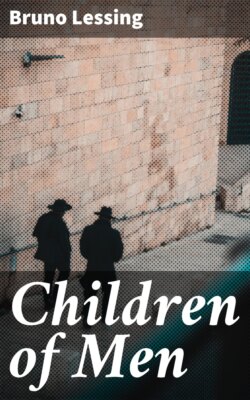Читать книгу Children of Men - Bruno Lessing - Страница 8
На сайте Литреса книга снята с продажи.
V
ОглавлениеTable of Contents
“There the wicked cease from troubling; and there the weary be at rest.
“There the prisoners rest together; they hear not the voice of the oppressor.
“The small and the great are there; and the servant is free from his master.”
It is written in Israel that the rabbi must give his services at the death-bed of even the lowliest. The coffin rested on two stools in the same room in which she died; beside it stood the rabbi, clad in sombre garments, reading in a listless, mechanical fashion from the Hebrew text of the Book of Job, interpolating here and there some time-worn, commonplace phrase of praise, of exhortation, of consolation. He had not known her; this was merely part of his daily work.
The sweatshop had been closed for an hour; for one hour the machines stood silent and deserted; the toilers were gathered around the coffin, listening to the rabbi. They were pale and gaunt, but not from grief. The machines had done that. They had rent their garments at the neck, to the extent of a hand’s breadth, but not from grief. It was the law. A figure that they had become accustomed to see bending over one of the machines had finished her last garment. Dry-eyed, in a sort of mild wonder, they had come to the funeral services. And some were still breathing heavily from the morning’s work. After all, it was pleasant to sit quiet for one hour.
Someone whispered the name of Braun, and they looked around. Braun was not there.
“He will not come,” whispered one of the men. “It is in the newspaper. He was sent to prison for three years. He stole something. A picture, I think. I am not sure.”
Those who heard slowly shook their heads. There was no feeling of surprise, no shock. And what was there to say? He had been one of them. He had drunk out of the same cup with them. They knew the taste. What mattered the one particular dreg that he found? They had no curiosity. In the case of Nitza, it was her baby who was dying because she could not buy it the proper food. Nitza had told them. And so when Nitza cut her throat they all knew what she had found in the cup. Braun hadn’t told—but what mattered it? Probably something more bitter than gall. And three years in prison? Yes. To be sure. He had stolen something.
“Wherefore is light given to him that is in misery,” droned the rabbi, “and life unto the bitter in soul:
“Which long for death, but it cometh not; and dig for it more than for hid treasures;
“Which rejoice exceedingly, and are glad, when they can find the grave?”
And the rabbi, faithful in the performance of his duty, went on to expound and explain. But his hearers could not tarry much longer. The hour was nearing its end, and the machines would soon have to start again.
It is an old story in the Ghetto, one that lovers tell to their sweethearts, who always cry when they hear it. The machines still roar and whirr, as if a legion of wild spirits were shrieking within them, and many a tear is stitched into the garments, but you never see them, madame—no, gaze as intently upon your jacket as you will, the tear has left no stain. There is an old man at the corner machine, grey-haired and worn, but he works briskly. He is the first to arrive each morning, and the last to leave each night, and all his soul is in his work. His machine is an old one, and roars louder than the rest, but he does not hear it. Day and night, sleeping and waking, there are a hundred thousand machines roaring away in his brain. What cares he for one more or one less?
